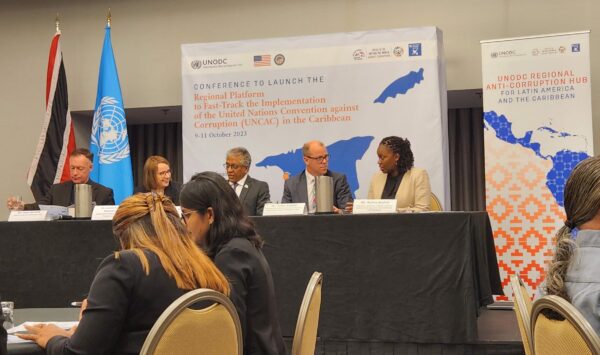6 November 2023 –
From the 9th to the 11th of October, the UNCAC Coalition’s Regional Coordinator for Latin America and the Caribbean, Iñaki Albisu, participated in the UNODC-led conference launching the Regional Platform to Fast-Track the Implementation of the UNCAC in the Caribbean, held in Port-of-Spain, Trinidad and Tobago. Conference participants included representatives from anti-corruption agencies, attorney generals’ offices, and other high-level anti-corruption officials from Caribbean countries including Antigua and Barbuda, Bahamas, Belize, Dominica, Grenada, Jamaica, Saint Lucia, and the host Trinidad and Tobago. The conference followed a similar format to a previous conference launching the Regional Platform to Fast-Track the Implementation of the UNCAC in Central America held in Roatan, Honduras in April 2023, where the UNCAC Coalition also participated.

The conference outcome was the production of a “roadmap” towards the establishment of the Regional Platform in the Caribbean to guide countries in the implementation of the UNCAC. The roadmap addresses four thematic areas:
- Stronger anti-corruption, legal and institutional frameworks
- Transparency and accountability in public procurement and in the public sector
- Reporting channels and whistleblower protection
- Investigation and prosecution of corruption and money laundering
Cross-cutting themes such as human rights and gender equality, as well as the use of technology to collect, exchange, and analyze data and promote transparency, access to information and accountability were also taken into account.
Despite a positive outcome regarding the roadmap, it is unfortunate that, as was the case in Honduras, the participation of only a very limited number of civil society organizations was made possible, and that considerations on Article 13 of the UNCAC were taken so lightly in the methodology of this conference. Due to late invitations and certain restrictions, only two civil society organizations ended up participating in this conference: the Trinidad and Tobago Transparency Institute and the UNCAC Coalition which, in the case of the latter, is an organization that does not speak for its members from the Caribbean. Caribbean NGO voices were thus more than underrepresented from the Conference.
In future events related to Central American or Caribbean platforms, we urge the UNODC and States Parties to include civil society organizations in plenary discussions. Beyond being an essential part of the UNCAC under Article 13 and its implementation more generally, civil society organizations can provide valuable perspectives on blind-spots that government agencies may not be aware of concerning anti-corruption policies. We hope that moving forward, spaces for interaction between civil society organizations and governments become the standard.



